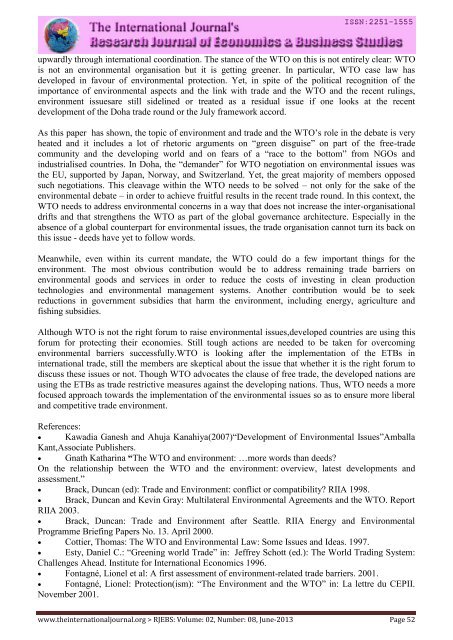Research Journal of Economics & Business Studies - RJEBS - The ...
Research Journal of Economics & Business Studies - RJEBS - The ...
Research Journal of Economics & Business Studies - RJEBS - The ...
- No tags were found...
Create successful ePaper yourself
Turn your PDF publications into a flip-book with our unique Google optimized e-Paper software.
upwardly through international coordination. <strong>The</strong> stance <strong>of</strong> the WTO on this is not entirely clear: WTO<br />
is not an environmental organisation but it is getting greener. In particular, WTO case law has<br />
developed in favour <strong>of</strong> environmental protection. Yet, in spite <strong>of</strong> the political recognition <strong>of</strong> the<br />
importance <strong>of</strong> environmental aspects and the link with trade and the WTO and the recent rulings,<br />
environment issuesare still sidelined or treated as a residual issue if one looks at the recent<br />
development <strong>of</strong> the Doha trade round or the July framework accord.<br />
As this paper has shown, the topic <strong>of</strong> environment and trade and the WTO’s role in the debate is very<br />
heated and it includes a lot <strong>of</strong> rhetoric arguments on “green disguise” on part <strong>of</strong> the free-trade<br />
community and the developing world and on fears <strong>of</strong> a “race to the bottom” from NGOs and<br />
industrialised countries. In Doha, the “demander” for WTO negotiation on environmental issues was<br />
the EU, supported by Japan, Norway, and Switzerland. Yet, the great majority <strong>of</strong> members opposed<br />
such negotiations. This cleavage within the WTO needs to be solved – not only for the sake <strong>of</strong> the<br />
environmental debate – in order to achieve fruitful results in the recent trade round. In this context, the<br />
WTO needs to address environmental concerns in a way that does not increase the inter-organisational<br />
drifts and that strengthens the WTO as part <strong>of</strong> the global governance architecture. Especially in the<br />
absence <strong>of</strong> a global counterpart for environmental issues, the trade organisation cannot turn its back on<br />
this issue - deeds have yet to follow words.<br />
Meanwhile, even within its current mandate, the WTO could do a few important things for the<br />
environment. <strong>The</strong> most obvious contribution would be to address remaining trade barriers on<br />
environmental goods and services in order to reduce the costs <strong>of</strong> investing in clean production<br />
technologies and environmental management systems. Another contribution would be to seek<br />
reductions in government subsidies that harm the environment, including energy, agriculture and<br />
fishing subsidies.<br />
Although WTO is not the right forum to raise environmental issues,developed countries are using this<br />
forum for protecting their economies. Still tough actions are needed to be taken for overcoming<br />
environmental barriers successfully.WTO is looking after the implementation <strong>of</strong> the ETBs in<br />
international trade, still the members are skeptical about the issue that whether it is the right forum to<br />
discuss these issues or not. Though WTO advocates the clause <strong>of</strong> free trade, the developed nations are<br />
using the ETBs as trade restrictive measures against the developing nations. Thus, WTO needs a more<br />
focused approach towards the implementation <strong>of</strong> the environmental issues so as to ensure more liberal<br />
and competitive trade environment.<br />
References:<br />
Kawadia Ganesh and Ahuja Kanahiya(2007)“Development <strong>of</strong> Environmental Issues”Amballa<br />
Kant,Associate Publishers.<br />
Gnath Katharina “<strong>The</strong> WTO and environment: …more words than deeds?<br />
On the relationship between the WTO and the environment: overview, latest developments and<br />
assessment.”<br />
Brack, Duncan (ed): Trade and Environment: conflict or compatibility? RIIA 1998.<br />
Brack, Duncan and Kevin Gray: Multilateral Environmental Agreements and the WTO. Report<br />
RIIA 2003.<br />
Brack, Duncan: Trade and Environment after Seattle. RIIA Energy and Environmental<br />
Programme Briefing Papers No. 13. April 2000.<br />
Cottier, Thomas: <strong>The</strong> WTO and Environmental Law: Some Issues and Ideas. 1997.<br />
Esty, Daniel C.: “Greening world Trade” in: Jeffrey Schott (ed.): <strong>The</strong> World Trading System:<br />
Challenges Ahead. Institute for International <strong>Economics</strong> 1996.<br />
Fontagné, Lionel et al: A first assessment <strong>of</strong> environment-related trade barriers. 2001.<br />
Fontagné, Lionel: Protection(ism): “<strong>The</strong> Environment and the WTO” in: La lettre du CEPII.<br />
November 2001.<br />
www.theinternationaljournal.org > <strong>RJEBS</strong>: Volume: 02, Number: 08, June-2013 Page 52

















